Helen H. Moore's Blog, page 65
May 24, 2018
President Donald Trump pardons late heavyweight boxing champion Jack Johnson
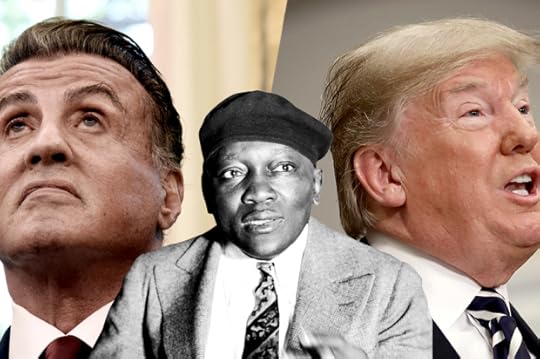
Getty/Olivier Douliery/Lass
President Donald Trump on Thursday granted a posthumous pardon to late boxer Jack Johnson, the first black heavyweight champion, who was convicted in 1913 of transporting a white woman across state lines, following the urging of actor Sylvester Stallone. The president referred to "Rocky" star as "Sly," boasting that the two have been friends for "a very long time."
Trump signed the pardon for Johnson during an Oval Office ceremony. Those who joined him included Stallone, current heavyweight champion Deontay Wilder, heavyweight champion Lenox Lewis and Johnson's great-great niece Linda Bell Haywood.
"Today, I've issued an executive grant of clemency – a full pardon – posthumously to John Arthur 'Jack' Johnson . . . the first African-American heavyweight champion of the world," Trump said.
The president called Johnson "a truly great fighter," who "had a tough life" and served 10 months in federal prison "for what many view as a racially-motivated injustice." Trump added that the conviction took place during a "period of tremendous racial tension in the U.S."
In the decades after Johnson was convicted, and as society became more enlightened, Johnson's case garnered significant national attention as a symbol of racial injustice in the American justice system.
"We have done something today that was very important, because we righted a wrong," Trump continued. "Jack Johnson was not treated fairly, and we have corrected that. And I'm very honored to have done it."
The boxing champion was convicted of violating the Mann Act, which made it illegal to transport women across state lines "for immoral purposes."
Johnson was sentenced to a year in prison in 1913, but he fled the country for several years. He returned in 1920 to serve his sentence.
"He was treated very rough, very tough," Trump said Thursday as he signed what he referred to as an "a full pardon" for Johnson.
The president pointed out that bipartisan requests for Johnson's pardon date back years. Nonetheless, no previous president had been willing to grant one. Politicians and celebrities including current Sen. John McCain, former Senate Majority Leader Harry Reid, Stallone and filmmaker Ken Burns have advocated for Johnson's pardon.
Congress also unanimously approved a resolution in 2009 calling for the champion's pardon. In 2013, a century after Johnson's conviction, Congress reintroduced the resolution.
Trump also took a jab at former President Barack Obama, who rebuffed pardoning Johnson, in part due to allegations of domestic violence against women, according to the New York Times.
In April, Trump had tweeted that he was considering granting a pardon to Johnson.
Sylvester Stallone called me with the story of heavyweight boxing champion Jack Johnson. His trials and tribulations were great, his life complex and controversial. Others have looked at this over the years, most thought it would be done, but yes, I am considering a Full Pardon!
— Donald J. Trump (@realDonaldTrump) April 21, 2018
"Sylvester Stallone called me with the history of heavyweight boxing champion Jack Johnson. His trials and tribulations were great, his life complex and controversial," Trump wrote in a tweet at the time. "Others have looked at this over the years, most thought it would be done, but yes, I am considering a Full Pardon!"
Facebook opts to label political ads — but experts say their plan is deeply flawed
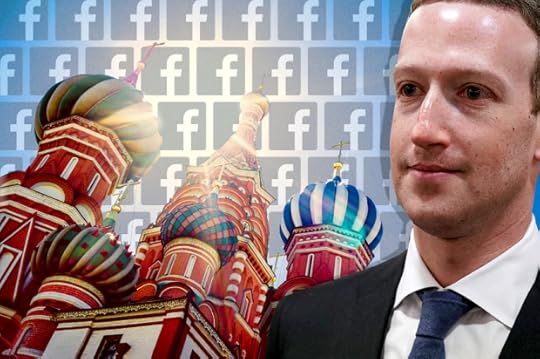
Getty/Salon
Just in time for primary election season and ahead of the 2018 midterms, Facebook announced Thursday it will start labeling political and issue ads on the social network — a move intended to prevent another foreign propaganda situation whereby bad actors purchase political ads intended to influence elections.
Fulfilling a promise it made last year, the social media giant revealed a new labeling system, which will show users who paid for a political ad and demographic information for audiences who were targeted by it.
Advertisers will also need to register with Facebook by "confirming their identity and location" with the company.
"Starting today, all election-related and issue ads on Facebook and Instagram in the U.S. must be clearly labeled – including a 'Paid for by' disclosure from the advertiser at the top of the ad," said Rob Leathern, Director of Product Management at Facebook. "This will help ensure that you can see who is paying for the ad – which is especially important when the Page name doesn't match the name of the company or person funding the ad."
Political ads will now come with an explicit disclosure, noting who paid for the ad. Users who click on any of those disclosures will be able to visit a special archive page for the ad, where they can see other ads bought by the advertiser as well as how much money the advertiser paid for the campaign and the audiences it targeted.
Users from around the world can also visit the page "Political Content Ads" to browse any political or issue ads an advertiser has run in the United States for up to seven years — a period the company decided on to ensure it covers a full Senate cycle of six years. The company plans to launch similar labeling and archiving features to other countries around the world in the coming months.
This change is in line with Facebook's recent attempts to improve user engagement and raise public trust.
The social networking behemoth has come under fire for virally spreading misinformation, harboring a plethora of fake accounts and, most recently, breaches of trust — particularly the revelation that Cambridge Analytica, an election consultancy used by President Donald Trump’s 2016 campaign, had accessed personal data from as many as 87 million users without their knowledge. In public testimony, Facebook CEO Mark Zuckerberg expressed regret over the Cambridge Analytica scandal, and tried to sell Facebook as a communitarian tool rather than an advertising company that profits off monetizing its users personal data.
The recent data scandal wiped away tens of billions of dollars from Facebook’s market value, sparked scrutiny from politicians of every stripe, and even prompted public discourse over the once-unthinkable notion that Mark Zuckerberg should step down as CEO and chairman of the company. It also reignited long-simmering questions about the menace it poses to the world’s privacy, civil discourse and domestic democratic institutions.
Zuckerberg faced two days of questions on Capitol Hill about Facebook’s responsibilities to users and data collection practices in the wake of the Cambridge Analytica revelations.
"We think these features set a new standard for transparency in visual advertising, and they're part of our broader election integrity work," Leathern said. He then noted that Facebook might not catch every political ad that is not properly labeled, and said Facebook encourages users to report improperly labeled ads. Facebook will then review them, he said, and if it turns out that the advertiser violated Facebook's political advertising policy, it "will be prevented from running election-related and issue ads until they complete the authorization process."
"This is the tool that makes it easier for you to find problems, and that's something that we want," he continued. "We invite you to report any ad so we get better, faster."
Some people have argued that getting rid of political ads on Facebook is the only sure-fire way of protecting against foreign election meddling, while others have made the case that barring political ads on Facebook would unfairly favor incumbent politicians and candidates with deep pockets.
Digital advertising is usually more affordable than television or print ads, providing less well-funded politicians, NGOs, researchers and journalists a relatively economical way to get their message out.
Facebook's new ad labeling perhaps extends beyond ads that are shown on TV, as it plans to label issue-based ads as political in addition to ads from candidates and campaigns. The social network is using a list of 20 wide-ranging issues to classify political ads. The list includes issues like education and guns, but also ads that make political statements about health, taxes and values — some of which have messaging that might be difficult to classify as explicitly political.
"One of the important considerations around regulating and restricting political ads is taking steps to prevent those rules from inadvertently sweeping up non-partisan journalistic content," said Parker Higgins, Director of Special Projects at the Freedom of the Press Foundation. "Unfortunately, some of the more simplistic heuristics for categorizing political ads include those kinds of stories—stories that can change the outcome of elections, but only through creating a more informed population."
"Facebook of course has the right to bar any kinds of ads it wants, but lots of media outlets have found Facebook advertising worthwhile and it would be frustrating to see that tossed aside in the name of a blanket ban," Higgins added.
Norman Shamas, an independent cyber security consultant, said with Facebook, "it all comes down to trust."
"The efficacy of ads and information campaigns relies heavily on the audience’s understanding of media literacy, algorithm literacy," Shamas said. "Facebook's role in this is that they aren’t transparent about algorithm design and how they relate to targeted ads or even recognition of information campaigns."
"Transparency around what algorithms they have, what data they use, and whether they are implementing the algorithms (and why/why not) is important," Shamas added.
Felicia Cravens, a Texan who runs a Facebook page called Unfakery that helps track down fraudulent accounts, said is concerned about the list of items Facebook is considering "political" and "how they could possibly intend to fairly and equitably review the massive amounts of political advertising that will be purchased for candidates and issues at all levels."
"Too often when Facebook is confronted with a problem, they apply a patch or a one-size-fits-all solution that they inevitably have to walk back later," Cravens said. "This leaves many people confused and unsure which policies are in place at any given time."
"With something as important as political ads, Facebook again seems to be bumbling around, trying to find a workable solution that will scale to a wide variety of scenarios," Cravens added. "And given that so much of American life is becoming politicized, things that wouldn't be seen as political before now will be."
As plastic straw bans become mainstream, some fear pushback from corporations

Shutterstock
Plastic straws may be sucking the life out of our ecosystems.
Videos and images of tortoises with plastic straws stuck in their nostrils went viral in the past year, while high-profile conferences like the World Economic Forum say there might be more plastic than fish (in terms of weight) in the oceans by 2050. Plastic straws were among the top 10 items collected during the 2017 International Coastal Cleanup Day. In turn, some conservationists and policymakers have taken a keen interest in the demise of the disposable straw.
Case in point: the city of San Francisco, which has set environmental precedents for the country before (such as with their plastic bag ban), is proposing legislation to ban plastic straws in order to reduce litter in the city’s streets. The proposed initiative would prohibit single-use plastic straws and other plastic foodware such as plastic stir sticks, plastic toothpicks, and plastic splash sticks. The legislation also aims to eliminate persistent toxic fluorinated chemicals from foodware products.
If passed, the ordinance would take effect on July 1, 2019.
"Here in San Francisco, this is quite literally the last plastic straw,” San Francisco Supervisor Katy Tang, who proposed the legislation, said while announcing the news. “We need to step up and do something about our wasteful daily habits when there are other alternatives.”
“Millions of plastic straws are discarded annually and add to the tremendous waste in our society,” Supervisor Ahsha Safaí added. “We need to change people's behavior and provide a reusable option.”
It is worth noting San Francisco is not the only city considering this ordinance—or has already enacted a ban. New York City is eyeing similar legislation. Malibu, Calif., has already banned restaurants from handing out plastic straws and stirrers. Seattle is set to ban plastic straws and utensils. Across the pond, the United Kingdom is also gearing up to prohibit single-use plastics, such as straws. Institutions are following suit, too: Dignity Health has removed plastic straws and stirrers from its 39 hospitals, specifically in their cafeterias (there is an exception for patients).
The idea that consumers need to curb their consumption habits — or that the state needs to nudge them to — has long been part of the ongoing discourse in modern environmentalism. In a way, it is partly a result of consumers being pigeonholed by the oil and gas companies, the conglomerates who are manufacturing plastic. Yet as progressive cities move toward a plastic straw ban, one that will undoubtedly upset some interest groups — McDonald’s has reportedly pushed back already — it raises questions about civic responsibility and corporate responsibility. At what point do we share the responsibility of shifting our behavior with the corporations who manufacture the straws? What happened to systemic change rather than consumer behavior?
Writing in the Guardian, Martin Lukacs eloquently described this incongruity. In his piece “Neoliberalism has conned us into fighting climate change as individuals,” Lukacs notes that according to the Carbon Majors Database, 100 companies are responsible for 71 percent of the world’s carbon emissions since 1988. Keeping in that in mind, are consumers bans — rather than industrial regulation — really the answer?
Nicole Kozlowski, the Rise Above Plastics Program Vice Lead of the Surfrider Foundation in San Francisco, said these types of bans do make a positive impact on the environment, yet said that bans are not the one-size-fits-all solution to reducing plastic consumption.
“While these bans are seen as the weight falling on the consumers’ shoulders, it is more of an educational tool,” Kozlowski explained, who is also the co-founder of Wisdom Supply Co, a company that provides sustainable school supplies to teachers. “These statewide bans and legislators act as wide-sweeping public awareness about an issue that not everybody has the opportunity to learn about, and with a material like plastic straws that can’t be recycled, they are clogging storms drains, littering city streets and costing taxpayers in California millions of dollars to clean up and they are ending up on our shores and beaches.”
As Kozlowski explained, the ban is not a ban on straws—instead, it is part of the ongoing effort to prohibit plastic.
“The issue with plastic is that there is too much of it in the system and there is nowhere for it to go,” Kozlowski told Salon.
Mark Murray, Executive Director of Californians Against Waste, echoed Kozlowski’s sentiments about how plastic-straw bans are not about the straws, but about the plastic.
“While reducing the number of one-time-use plastic straws generated daily is an important objective, Supervisor Tang’s proposed ordinance is much more comprehensive than ‘banning straws,” said Mark Murray, Executive Director of Californians Against Waste. “Supervisor Tang’s proposed ordinance would update and expand San Francisco’s already successful local ordinance targeting disposal plastic food service ware. The measure will phase-out the use of most common disposable plastic utensils in favor of recyclable, compostable or reusable items.”
According to a study in the journal Science Advances, an estimated 8300 million metric tons of virgin plastics, those that have not been recycled, have been produced to date. By 2015, approximately 6300 metric tons of plastic waste had been generated; only 9 percent of which had been recycled. Twelve percent was incinerated, and 79 percent was collected in landfills or the natural environment. Plastic is a byproduct of fracking for oil, and as a natural gas, overwhelming evidence suggests it is largely responsible for Earth’s changing climate.
Kozlowski said what it boils down to is a fight against the world’s most powerful companies.
“Oil and gas companies are putting more effort into making more plastic products because they earn a quarter of their profits from the plastic production,” she said. “It is in their best interest to make plastic products cheap.”
These companies are reportedly receiving more investments. According to a report by the Center for International Environmental Law, in April 2016, the American Chemistry Council revealed the chemical industry will spend over $164 billion on 264 new facilities or expansion projects in the United States by 2023.
While consumers will be forced to forgo their straws, the companies manufacturing plastics—or the chemicals needed—are seemingly expanding their operations. Advocates and policymakers are hopeful that consumers bans will have a bottom-up approach to eventually shaking up the corporations that need it.
“I believe that the ban itself will force manufacturers to change their business model – especially as San Francisco is not the only jurisdiction with such proposed legislation,” Tang told Salon. “Manufacturers will need to get on board with the new regulations and a cultural shift in single-use plastic foodware.”
When women age without apology: “What would Virginia Woolf do?” is a rally cry for women over 40
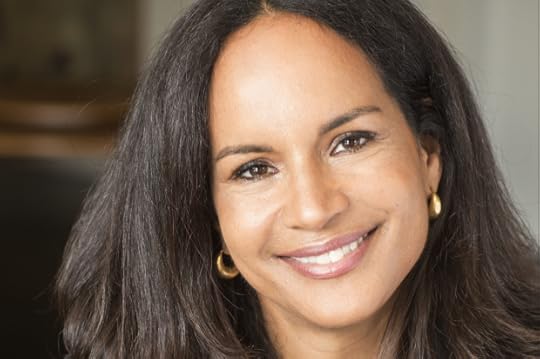
Elena Seibert
If you look at advertising, TV shows, movies, magazines, and pretty much every form of cultural expression, women are supposed to be sexy and young. As long as we fit a certain silhouette, our nubile, fertile young flesh is adored, desired and celebrated.
And when we stop looking young due to the anatomical (and gravitational) realities of aging? Well, then. It’s best that we either try to appear as young as possible via artificial means — or disappear from relevance.
But here’s the thing: We don’t disappear. And even when we do everything we can to stay fit and look young on the outside, be it plastic surgery, extreme skin care regimens, or artfully applied cosmetics, many of us are still forced to confront the transformations happening on the inside--and the way the people in our lives respond to those transformations (typically by pretending they aren’t happening). I almost didn’t interview Nina because I thought as someone in my 40s a book about aging was certainly not relevant to me, but the fact is we're all aging. Every day. And it turns out there is a lot to talk about as you peer over that psychological hill.
Hormonal changes. Marital problems and infidelity. Dating after divorce. Finding sensuality in your post-multiple-pregnancy, middle-aged physique. Having regrets about taking a career break to raise kids. Cosmetic procedures. These are things that we rarely talk about in public or even privately with our friends, but we need to talk about it with someone. The question is, who?
In 2015, author Nina Collins created a secret Facebook group. It was a place where she could seek the advice of her friends who had already experienced perimenopause and other physical changes related to aging. Friends invited friends and now the group, called “What Would Virginia Woolf Do?” (WWVD) has grown to a 17,000 member community in which women share — and sometimes overshare — the challenges and fears and triumphs of life over 40.
“It's been a very interesting organic experience of really smart women over 40 wanting to talk about where they are in life,” Nina told me in our recent interview for my podcast "Inflection Point." “It started as a place to talk about health stuff and now it's . . . very much a place where we talk about who we want to be and the second half of our lives, basically.”
Clearly Nina Collins has broken the ice for a conversation that women over 40 have been desperate to have: one in which we confront our shame, embrace our imperfections, honor what makes us unique, and benefit from our collective wisdom so that we can lift each other up.
Sounds like feminism to me.
The question is, why do we need a private online group to make these conversations happen? Why don’t we talk about the realities of middle age womanhood with the same frankness and positivity that we do about puberty and pregnancy? And what happens when we stop treating aging as a shameful secret and honor it as a time of transformation, wisdom, and self-actualization?
Nina has captured the essence of this group and her own reflections on “aging” in her new book, "What Would Virginia Woolf Do? And Other Questions I Ask Myself As I Attempt To Age Without Apology." Listen to our conversation here on "Inflection Point."
And when you’re done, come on over to The Inflection Point Society, our Facebook group of everyday activists who seek to make extraordinary change through small, daily actions.
Subscribe to "Inflection Point" to get more stories of how women rise up right in your feed on Apple Podcasts, RadioPublic, Stitcher and NPROne.
Moses Farrow defends his father Woody Allen, claims Mia Farrow abused her kids

AP/YouTube
Moses Farrow, the adopted son of Mia Farrow and Woody Allen, has been one of the filmmaker's chief defenders in recent years. Allen, who was accused by his adopted daughter Dylan Farrow of molesting her when she was seven, has faced renewed scrutiny in the era of #MeToo, with several former collaborators expressing remorse for working with him.
But in an expansive, explosive blog post published Wednesday, Moses affirmed his support for his father and dismissed the sexual assault allegations. He also accused his mother of inflicting mental, verbal and physical abuse on him and his siblings. And Moses shared his own recollection of the August day in 1992, when Dylan says her father sexually abused her.
"It was important to my mother to project to the world a picture of a happy blended household of both biological and adopted children, but this was far from the truth," Moses wrote. "I’m sure my mother had good intentions in adopting children with disabilities from the direst of circumstances, but the reality inside our walls was very different. It pains me to recall instances in which I witnessed siblings, some blind or physically disabled, dragged down a flight of stairs to be thrown into a bedroom or a closet, then having the door locked from the outside. She even shut my brother Thaddeus, paraplegic from polio, in an outdoor shed overnight as punishment for a minor transgression."
Moses claims that of this abuse, "Soon-Yi was her most frequent scapegoat." He said that Farrow also brainwashed them constantly, "coaching, drilling, scripting, and rehearsing" stories until they matched what she wanted to hear. And he alleges that this is what happened with Dylan and her accusation against Allen.
Moses said that on Aug. 4, 1992, Farrow instructed him to watch Allen closely. He said, "Along with five kids, there were three adults in the house, all of whom had been told for months what a monster Woody was. None of us would have allowed Dylan to step away with Woody, even if he tried."
Moses rehashes the investigations into Allen, saying, "Mia's accusation was fully investigated by two separate agencies and charges were never brought. Mia reached the end of the legal runway after it was determined that the abuse never occurred." And he compared Allen and Dylan's accusation to the allegations against now outed sexual predators:
In this time of #MeToo, when so many movie heavyweights have faced dozens of accusations, my father has been accused of wrongdoing only once, by an enraged ex-partner during contentious custody negotiations. During almost 60 years in the public eye, not one other person has come forward to accuse him of even behaving badly on a date, or acting inappropriately in any professional situation, let alone molesting a child.
Moses does not address the claim from actress Mariel Hemingway, who says Allen tried to seduce her when she was a teenager. And according to Vanity Fair, Moses' charged blog post ignores important facts from the child molestation allegation, case and trial that are frankly damning. Investigative reporter Maureen Orth, who has written about it for over 25 years, curated "10 Undeniable Facts About the Woody Allen Sexual-Abuse Allegation" in 2014, which counters some of Moses' critical points.
Allen and Moses paint Dylan's accusation as crafted by her mother for retribution for Allen beginning a sexual relationship with Farrow's adopted daughter Soon Yi. "Mia never went to the police about the allegation of sexual abuse," Orth wrote. "Her lawyer told her on August 5, 1992, to take the seven-year-old Dylan to a pediatrician, who was bound by law to report Dylan’s story of sexual violation to law enforcement and did so on August 6."
Also, Allen has clung to the isolation of the single claim against him in his lifetime, which Moses reiterates. But Orth wrote that Farrow's instructions for Allen to never be left alone with Dylan was communicated to Moses, babysitters, etc, because "Allen had been in therapy for alleged inappropriate behavior toward Dylan with a child psychologist before the abuse allegation was presented to the authorities or made public."
Further, the judge who granted Farrow full custody of Moses, Dylan and Ronan found Allen's behavior toward Dylan to be "grossly inappropriate and that measures must be taken to protect her," Orth reported.
Moses ended his post indicating some sympathy for his sister Dylan. "Like you, I believe in the power of speaking out," he wrote. "I have broken my silence about the abuse inflicted by our mother. My healing began only after getting away from her. And what she has done to you is unbearable. I wish you peace, and the wisdom to understand that devoting your life to helping our mother destroy our father’s reputation is unlikely to bring you closure in any kind of lasting way."
Both Dylan and her brother Ronan addressed Moses' post on Twitter, attributing it to deflection. "My brother is a troubled person," Dylan wrote. "I am so sorry he's doing this."
All I have to say with regard to the latest regarding my brother. pic.twitter.com/8WVAXOMKZV
— Dylan Farrow (@RealDylanFarrow) May 23, 2018
Ronan defended the parenting of Farrow and concluded, "I believe my sister."
All I’m going to say about efforts to deflect from my sister‘s allegations: pic.twitter.com/IRrj5fzMqV
— Ronan Farrow (@RonanFarrow) May 24, 2018
Meghan McCain melts down after audience and co-hosts turn against her on NFL protests
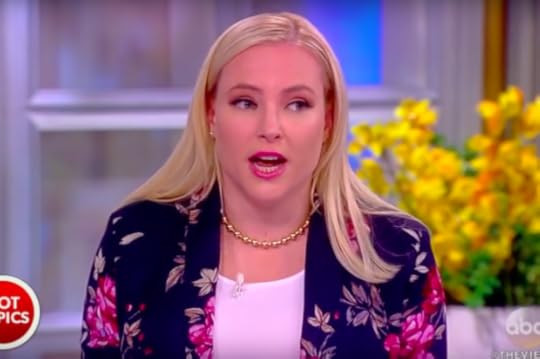
YouTube/The View
This article originally appeared on Raw Story

“The View” host Meghan McCain sputtered in frustration after the rest of her co-hosts — and the audience — turned against her over NFL player protests against racism and police brutality.
Team owners voted Wednesday to ban on-field protests, after President Donald Trump personally attacked players and threatened to change tax laws that benefit the NFL, and co-host Sunny Hostin said critics don’t understand the purpose of the demonstrations.
“This protest is not about the national anthem, this protest is not about the flag,” Hostin said.
“Think about the Milwaukee Bucks player, Sterling Brown, who was tased for doing nothing by the police,” she added. “This country terrorizes African-American men at a bigger rate than white men. If I want to kneel because I don’t think America is as great as she can be, I don’t think America has lived up to the promise of the flag, that means I am just as American as you are when you stand in homage to your parents’ service.”
Co-host Joy Behar pointed out that Trump had rarely seemed angrier than when he called out former San Francisco 49ers quarterback Colin Kaepernick, whose career ended over his silent protest — and McCain justified the president’s rage.
“It’s a very emotional issue,” McCain said. “I can’t analyze his anger in different places, he has been angry and irrational in a lot of different places.”
McCain explained that her views on the protests differed from her tablemates, but she clung to poll numbers showing most Americans agreed with her.
“I disagree with everyone on this table,” she said. “I would never be okay with somebody not saluting the flag. By the way, 72 percent of Americans, according to Reuters, said that they thought Kaepernick’s behavior was unpatriotic.”
Hostin cut in to say the vast majority of black Americans called Kaepernick a patriot, and McCain immediately lashed out.
“Can I just finish what I’m saying,” McCain said, as the audience erupted into applause to support Hostin.
“I’m still talking!” McCain shouted at the studio audience. “I’m still talking, I’m still speaking.”
Behar reminded the panelists that everyone got a turn to speak, but at that point host Whoopi Goldberg ushered the show into a commercial break.
Top Trending
Check out the major news stories of the day
Malaysia Airlines Flight 17 was brought down by a Russian missile: report

AP Photo/Vincent Thian
International investigators have again concluded that Malaysia Airlines Flight 17, which was shot down on July 17, 2014 while flying over eastern Ukraine, was hit by a Russian missile.
The airplane crash killed 298 people including 283 passengers and immediately prompted international outcry. Although Russia has repeatedly denied any involvement in the crash, the Dutch Safety Board concluded in 2015 that it had been downed by a Buk missile brought in from Russia on the previous day, according to the BBC. One year later, the Joint Investigation Team (JIT) claimed that it had "irrefutable evidence" that the missile had been fired from a field controlled by pro-Russia fighters after being brought in from Russian territory. The team that issued this report included members from Australia, Belgium, Malaysia, the Netherlands and Ukraine.
On Thursday, JIT doubled down on its assertion, declaring that the missile had originated from a western Russian unit and fired from Ukrainian territory held by pro-Russia rebels. One Dutch official from JIT, Wilbert Paulissen, told reporters that "all the vehicles in a convoy carrying the missile were part of the Russian armed forces." He specified that the missile had come from Russia's 53rd anti-aircraft brigade in Kursk.
Russia's defense ministry responded by repeating what they have said since 2014: they had nothing to do with it.
"Not a single anti-aircraft missile system from the Russian Federation has ever crossed the Russia-Ukraine border," proclaimed the defense ministry in Moscow.
JIT's announcement was offered two days after some family members of those killed on Malaysia Airlines Flight 17 published an open letter in the Russian news site Novaya Gazeta, according to NPR. In that letter, they made it clear that while they do not blame the Russian people, they do blame the Russian state.
Like all who have suffered the violent death of people we love, we are tempted to respond with hate. But we have to separate ordinary Russian people from the individuals responsible - the chain of command that led to the shooting down of MH17. Most of us don’t know Russian people well. Hate and distrust come partly from ignorance and when we know more of a person’s story, that can change how we see things. We know that the Russian people have a right to thrive, as did our loved ones. Still, we struggle. If we are able to change it will take time. But we know that giving in to hatred and bitterness would consume us and, unchecked among the nations, it will destroy human life on this planet.
It is easier when we remember we are all human beings and what we have in common. Some of us saw the faces of Russian families after Metrojet Flight 9268 was bombed and crashed over Egypt in October 2015, killing all 224 people on board. They were overwhelmed with grief, struggling to comprehend what had happened. We understand that disbelief, the horror of your loved one’s lives being taken violently and without warning. If ever we met those families perhaps we could start a conversation, for we would already know a central truth about each other’s lives.
No, we do not blame the Russian people for what happened. We are not against you. We hold the Russian state and its leaders as ultimately responsible for the deaths of our family members. All the credible evidence points in that direction. It has already been a long wait for us, but sometime in the future the five nation Joint Investigation Team will deliver its final report and people will be named. Then it will be up to the appointed court in the Netherlands to carefully weigh the evidence and reach a conclusion about which individuals were responsible.
Top Trending
Check out the major news stories of the day!
Poison of the right-wing female pundit: Tomi Lahren, Serena Joy and that “Dear White People” finale
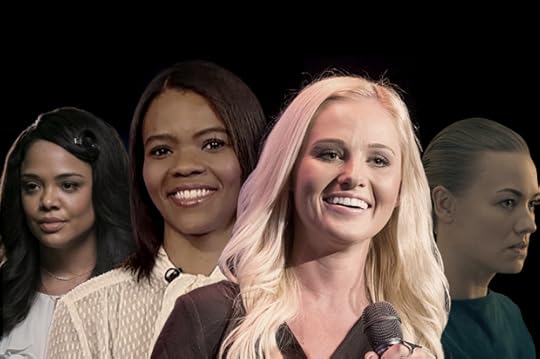
Netflix/YouTube/AP/Hulu
Spoiler alert: This article discusses plot points from episodes of "Dear White People" and "The Handmaid's Tale." If you are not caught up on these series and do not wish to have a couple of significant twists ruined, stop reading now.
None of the episodes leading up to the second season finale of “Dear White People” adequately prepares us for the moment when Sam White meets, um . . . let's call her "Dark" Sam White.
That secondary descriptor refers to the tainted moral alignment of Rikki Carter, the conservative firebrand played by Tessa Thompson. Netflix asked critics to refrain from revealing Thompson’s cameo prior to the return of “Dear White People” at the beginning of May; Thompson originated the role of Sam in the film that inspires the Netflix series, in which she’s played by Logan Browning.
So when the series’ version of Sam, the passionate, outspoken and combative host of Winchester University’s radio talk show “Dear White People” sneaks backstage to confront Rikki minutes before she’s set to take the stage for a campus speaking event, it’s more than merely a thoroughly meta moment. Theirs is the meeting of matter and anti-matter, annihilating Sam’s concept of who she is by presenting her with the worst of what she could be.
“I love the character!” Rikki tells Sam after admitting she’s listened to her show. “She’s 'sista girl,’ but can articulate the fuck out of a multisyllabic synonym for oppression. Genius!”
“She is not a character,” Sam angrily retorts.
“Oh not yet, but give her time, hon,” Rikki says. “Keep building up a following online, maybe get a few bookings on the local news circuit. In no time, you'll be on cable."
“It's so easy nowadays," Rikki adds. "Just wait for a shooting. Any kind will do: unarmed black teen, a school, a church or wherever the next misogynistic white lunatic decides to unload his guns. Just hop on that talking head train. Because when the world gets hold of her? Game over.”
I’ve been thinking about Rikki a lot lately, and Serena Joy, the wife of Commander Waterford on Hulu’s “The Handmaid’s Tale”: same type of woman, but different in fundamentally vital ways. Each is a signpost on the road to the collective hell that waits us all, and if each bears a resemblance to real women, it’s because they will always exist in some form.
Yvonne Strahovski, the actress who plays Serena Joy, is the kind of flaxen-haired beauty beloved by right-wing radio and television. Commentator Tomi Lahren is her closest equivalent in the real world, appearance-wise.
That said, Serena Joy works from a modicum of reason — a kernel, twisted though it may be. Lahren is a bomb-thrower whose main purpose is to command attention, punching down at minorities and liberal women, spewing whatever toxic messaging is most pleasing to the NRA and the "alt-right" at any given moment.
And she attempts to be all things to the right-wing spectrum: She’s pro-choice but detests feminism, although she admires strong women and lauds female empowerment, lately through gun ownership. Lahren’s response to the latest school shooting at Santa Fe High School is entirely unoriginal but probably netted her another paid speaking gig.
“Now is a time for healing, for togetherness, for prayer. It’s not the time to use this tragedy as a political prop for gun control but the left can’t help themselves and . . . to paraphrase Rahm Emanuel . . . will never let a good tragedy to go to waste,” she declared on Fox News.
Currently Lahren is making headlines due to a viral video making the rounds, featuring a man cursing at her and another person throwing water on her at a Minneapolis restaurant where she and her parents were having brunch.
Celebrities of all political stripes, including Kathy Griffin, have shown up on Twitter to decry the incident, as people of good conscience should. Assaults have a way of escalating quickly and nastily, especially in the realm of punditry; supporters back up rhetoric by threatening violence upon whatever threats their heroes decide to name.
Coincidentally we see frightening proof of this in the most recently released “Handmaid’s Tale” episode, titled “First Blood,” in which we see a flashback of Serena Joy appearing at a speaking engagement on, yes, a college campus.
When she takes the stage, she’s booed into silence, driven off and, shockingly, shot as she tries to make an exit, the bullet wound revealed as the source of her infertility.
Both Serena Joy and Lahren hold crude viewpoints, and in this episode, Serena Joy is demonstrably cruel to Offred (Elisabeth Moss) merely for the sake of putting her in her place, intentionally dropping a knitting needle on the ground and forcing Offred to retrieve it for her, to prove to a young wife — a teenager — that she outranks the Handmaid.
At least Serena Joy’s convictions, outlined in a book that becomes one of the founding texts of the patriarchal, Christo-fascist nation called Gilead, are in response to plummeting birth rates. A data point, in other words, not merely emotion, vanity or opportunism.
Serena Joy herself, whom Strahovski imbues with an icy steel, is the personification of the trickle down nature of oppression. She holds true to her path because she believes in it fiercely, and she’s also a woman of agency in the world before she came “under his eye.” And "The Handmaid's Tale" presents Serena Joy as an oddly sympathetic character. She's particularly astonishing here: after she’s shot, as she bleeds from her bullet wound and her husband Fred (Joseph Fiennes) weeps, she growls at him not to cry.
What happened to Lahren is wrong. What happens to Serena Joy in that episode is a horrific crime. But in different worlds, real and fictional, each woman makes a career out of writing the terms of her own submission and defeat. Serena Joy blames humanity’s existential crisis fertility rates on the refusal to embrace our biological imperative and “traditional” values — her definition of feminism, in other words.
Everything she does leading up to that life-altering appearance, and afterwards, unleashes a waterfall of greater crimes against humanity and her own gender.
That said, we never see whether Serena Joy qualifies to appear on “Fox & Friends,” where Lahren is a regular. Rikki Carter is prime Fox material, though.
Rikki’s Winchester show marks the culmination of a “Dear White People” season in which Sam and other black students at the fictional Ivy League institution endure a rising tide of "alt-right" aggression.
A troll (later revealed to be the vengeful gay Latino former editor of a campus newspaper) attacks Sam online, goading her into battles and feeding into threats to her physical safety. The campus radio station greenlights a conservative wing-nut response to her show titled “Dear Right People,” and through it all, confused students in the middle struggle to navigate the rising tensions.
Rikki’s speaking event represents the peak of that strife, but Simien also uses it to call attention to the concept of roles, especially ones that black students feel they have to live up to. There can be a price to showing one’s authentic self, but evolving it into a part can also be vastly lucrative.
Strangely enough, season 2 of “Dear White People” debuted only a few days after Kanye West declared himself to be a "free thinker" by opining that slavery was choice. To this day, most people agree that the comment itself is sheer ignorance but many people still wonder if he really meant it. And who came calling after West’s comment broke the internet? Right-wing media outlets, offering him a seat on the pundit train.
As “Chapter X” starts, we see a couple of white kids, desperate to be “woke,” casually refer to Rikki Carter as “Tan Coulter,” but to Sam she might be the Host of Wokeness Future, where her moral principles will eventually be supplanted by her character, as in the version of Sam White that sells books and a brand by shilling opinions that support the agenda of people in power.
“I got my start arguing absurd right wing views so I could win debate championships,” Rikki tells Sam. “So what if you're good this week and I'm bad the next? What matters most is who is powerless and who is powerful.”
Although “Chapter X” is written by Njeri Brown and series creator Justin Simien, who also directs the episode, Rikki’s chilling and frighteningly honest monologue came straight out of Simien’s brain, one of those midnight-download writers experience. He brought it to his staff and, with a few storyline refinements, filtered it through Rikki.
“It doesn't matter what part you play so long as the distraction helps those with the real power keep their fiefdoms nice and hidden,” Rikki tells Sam. “Keep in mind that I'm stacking these checks so I can build a goddamn kingdom of my own. Because in this country, all that matters is who holds the gold and owns land and its many resources.”
And though Simien admitted in a recent interview with Salon that he had not yet familiarized himself with personalities such as real life conservative pundit Candace Owens (to whom Rikki coincidentally bears a slight resemblance), what the character represents is depressingly ageless and transcends skin color.
“It's just a very complicated time on television right now,” Simien told Salon recently, “because how do you discern between someone who's being their authentic self on television and someone who is setting us back? It's a very gray area.”
This leads into an important distinction between the Tomi Lahrens of the world and the Rikki Carters, who we contend with in the form of Omarosa Manigault, Owens and the variety of black conservative commentators arguing talking points their white counterparts would be called racist for saying out loud.
Lahren’s looks and her status as a blonde white woman with that essential “Fox” look can keep her in rotation for years to come, allowing her to repackage herself endlessly until she can parlay herself into a mainstream gig.
If Lahren plays her cards right, she’ll have a number of paths to choose from: runs for political office, funded by deep-pocketed donors; her own media empire, which she’s building right now; maybe even a broadcast network gig, provided she rebrands herself strategically, a la Megyn Kelly.
Rikki, meanwhile, speaks to the trade-off black right-wing pundits make when she says to Sam, “We both picked what worked for us because girls like us need to get from the former to the latter as soon as possible, by any means necessary.”
Ironically, the black conservative’s shelf life tends to directly correlate to his or her integrity. Rikki lacks integrity and knows she’s only useful to the conservative platform for as long as her popularity holds. And “Chapter X” serves up just deserts for the initially confident and cocksure Rikki, who struts onstage to be greeted by a sea of black and brown people whose stony expressions deflate the hot air from her attention-seeking diatribe.
The time always comes when the pundit has to walk among the people from whose pain she profits, and they might have feelings about it. In "Dear White People," Rikki's comeuppance in no way endangers her and is still deeply satisfying. Lahren may never get hers, that water toss notwithstanding. As long as those checks keep clearing, she'll keep pumping out the bile, and we can expect any attempts at clarifying rebuttals to keep rolling right off.
Amanda Brugel of "The Handmaid's Tale"
How the Hulu series embraces resistance
Multiple women accuse Morgan Freeman of sexual harassment
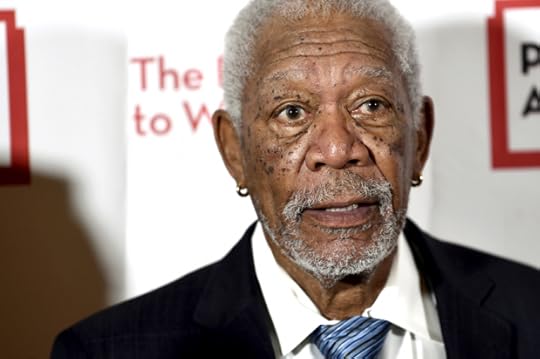
AP/Evan Agostini
Actor Morgan Freeman has been accused of sexual misconduct, including unwanted touching and inappropriate comments, by eight women, CNN reports.
Since the story's publication, Freeman has apologized for the incidents. "Anyone who knows me or has worked with me knows I am not someone who would intentionally offend or knowingly make anyone feel uneasy," the actor said in a statement. "I apologize to anyone who felt uncomfortable or disrespected — that was never my intent."
CNN said they spoke with 16 individuals about Freeman as part of this investigation, eight of whom alleged the actor harassed them and others who said they witnessed inappropriate behavior. Freeman's spokesperson did not respond to CNN's request for comment.
A production assistant who worked on the film "Going In Style" said Freeman "kept trying to lift up my skirt and asking if I was wearing underwear." He allegedly tried this repeatedly until co-star Alan Arkin make a comment. "Morgan got freaked out and didn't know what to say," the former assistant recalled.
A woman who was a senior member of the production staff of the movie "Now You See Me" in 2012 told CNN that Freeman would comment on the bodies of women on set and that they would be careful not to wear fitted clothing around him.
"He did comment on our bodies... We knew that if he was coming by ... not to wear any top that would show our breasts, not to wear anything that would show our bottoms, meaning not wearing clothes that [were] fitted," she said.
And Chloe Melas, a co-author of the CNN story, said she was also harassed by Freeman during a press event last year when she interviewed him for "Going in Style."
According to Melas, who was six months pregnant at the time, Freeman, in a room full of people, shook her hand while repeatedly looking her up and down, and saying more than once a variation of, "I wish I was there." She claims he also said to her, "You are ripe."
Multiple women said they never spoke publicly about Freeman's alleged inappropriate behavior before, fearing retaliation.
An entertainment reporter who is a member of the Hollywood Foreign Press Association said Freeman made remarks about her skirt and her legs during two different press events. Similar to many women in the report, she, too, declined to go on the record.
"I was just trying to do my job and I brushed it off," said the reporter, who did not want to be identified for the story because she's fearful of losing out on interviews with other celebrities, CNN says. "You don't want to put him on the spot because one, he's famous and two, it's on camera and three, you just want to do your job."
In the interview process, CNN learned that accusations against Freeman was something of an open secret, with several sources naming the actor before CNN had asked them if they had seen or been subjected to inappropriate behavior by an actor they had worked with.
Freeman is the latest high-profile man in Hollywood to come under fire for sexual harassment or misconduct. He is one of the most high-profile to date.
May 23, 2018
EPA security guards blocked, shoved reporters away from hearing
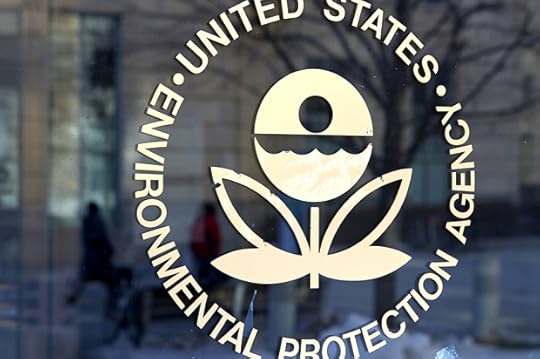
Getty/Justin Sullivan
This article originally appeared on AlterNet.

The Environmental Protection Agency “forcibly” blocked reporters form attending a Tuesday summit with EPA Administrator Scott Pruitt, at one point grabbing a “reporter by the shoulders” and shoving her out of the building.
As the Associated Press reports, the EPA blocked news organizations including the AP and CNN from attending the heading on contaminated drinking water.
“Guards barred an AP reporter from passing through a security checkpoint inside the building,” the AP reports. “When the reporter asked to speak to an EPA public-affairs person, the security guards grabbed the reporter by the shoulders and shoved her forcibly out of the EPA building.”In a statement, EPA spokesperson Jahan Wilcox said the reporters weren’t invited because there wasn’t enough space.
“This was simply an issue of the room reaching capacity, which reporters were aware of prior to the event,” he said. "We were able to accommodate 10 reporters, provided a livestream for those we could not accommodate and were unaware of the individual situation that has been reported.”
Top Trending
Check out what's trending in the news right now.



